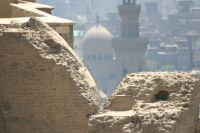The ‘Arab Spring’ of February 2011 was one that, involving as many countries as it did, generated a variety of different results, and different implications for future foreign policy in the region. The popular anti-authoritarian demonstrations typifying this movement fanned out to Syria, where a civil war still continues to rage, and to Egypt, where the ruler being protested was successfully ousted.
Magazines such as Foreign Policy approvingly published photo slideshows of the events in Cairo’s Tahrir Square and elsewhere: images appeared of simple terms like “Facebook” and “Twitter” daubed on Egyptian walls, seemingly evincing a pro-Western attitude on the behalf of the insurgents. Protesters were even spotted bearing witty placards with slogans like “No Mubarak, No Cry” (a clear reference to a similarly named Bob Marley tune). Countless parallels were drawn to the popular uprisings in Eastern Europe at the end of the 1980s, especially the mostly bloodless “Velvet Revolution” in Prague, with commentators noting the common feature of de-centralized protest. Much attention was also brought to the youthfulness of the protesting population (Egyptians under 25 comprise over half the total population) and the implications this might have upon a more democratic future in the region.However, foreign observers have been casting a wary eye on the country since this initial outbreak of revolutionary fervor. The government succeeding Mubarak’s, led by Mohammed Morsi and the Muslim Brotherhood-endorsed Freedom and Justice Party, soon came under fire for essentially replicating many of the same features that typified the former Mubarak government: in November 2012, Morsi claimed for himself a near-absolute authority and immunity from legal challenges, leading to the second outbreak of mass protests seen in the region in as many years.
In unequivocally harsh terms, critics as well-heeled as Mohammed El-Baradei began referring to Morsi as a “new pharoah”, and human rights watchdog groups the world over condemned the 2012 constitution as well. Though Morsi has since made many apparent concessions or attempted to mollify fears of him having dictatorial power, the graduates of the 2011 protest class are not buying it, and it is making for an ongoing situation of tension in the country’s urban centers.
Continued mass demonstrations in Cairo and Alexandria
As recently as a couple of weeks ago, fresh protests calling for the removal of the Muslim Brotherhood from power were set to descend upon Tahrir Square in Cairo and al Qa’id Ibrahim mosque in Alexandria, events which led the U.S. State Department to issue travel warnings and to bar embassy personnel from attending.
Though there is not a one-size-fits-all attitude towards foreign workers in the country, large protests of any kind are generally to be avoided because of the over-simplified views that large angry groups will adopt when whipped up into a righteous fury: few of us have the negotiation skills to talk down an irrationally outraged group, and to calmly explain why we aren’t complicit in such-and-such international affair. As always, American expats in the country may bear the brunt of local criticism, finding themselves in a position where they must either explain or apologize for policy issues whose nuances are not that easy to comprehend (e.g. the state’s confusing shifting of regional priorities from ensuring democracy to maintaining stability).
The U.S. administration’s perceived closeness to Hosni Mubarak, or at least their refusal to censure him outright, are still a sore spot for many locals despite Mubarak’s disagreement with U.S. leadership on several key policy issues (particularly the Iraq conflict). It is fairly well documented that the U.S. administration was reluctant to give up on Mubarak until his downfall was practically guaranteed.
Who should be more cautious than usual?
Foreign nationals from countries as seemingly neutral as Norway have become caught up in riotous activity and paid the price: the journalist Erlend Skevik, for example, suffered some blows during his coverage of the 2011 protests and could have easily suffered worse. Adding insult to injury, Skevik’s news coverage created a viral internet phenomenon in which his homely looks, rather than his journalistic courage, captured the public imagination. Wise guys everywhere had great fun Photo-shopping his head onto the bodies of other famous figures in a typical “only on the internet” moment of weird humor.
A caveat to all this is that Egypt has a highly educated middle class, who are certainly approachable for discussion and even debate when alone or in small groups. As mentioned above, they are mostly young, culturally savvy and likely to know a great deal about the sort of pop trivia that allows one to segue a little more easily into ‘difficult’ topics of conversation.
A recent knife attack on the perimeter of the U.S. Embassy in Cairo seems to underscore the attitude of locals towards foreign officials: those who are seen as manipulating foreign policy will be targeted ahead of other expats. Except among the most radical Egyptians, Westerners merely doing business or studying in the region are not necessarily seen as enemies to be dealt with accordingly. As already mentioned, the same Egyptians likely to fall into the protest groups are usually intelligent enough to make the distinction between those engaging in trans-national commerce and those directly employed by a foreign government.

